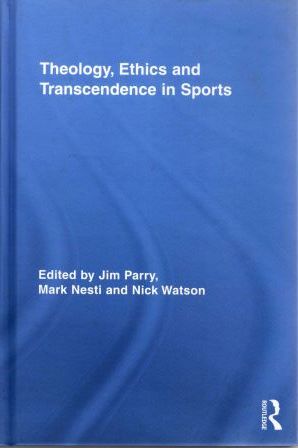"I jump into a sand pit for a living"
Theology, Ethics and Transcendence in Sport
Return to the book list for titles beginning with 'T'.
Edited by Jim Parry, Mark Nesti and Nick Watson, Routledge, London 2010.
The book comprises papers delivered at the Inaugural International Conference on Sport and Spirituality (IICSS), at York in 2007. There are 11 chapters arranged under 3 headings:
Theological Ethics in Sport;
Psychological and spiritual dimensions of sport;
Transcendence in Movement, Play and sport;
My interest and expertise is confined to Christianity and sport. As a consequence the review concentrates on chapters, which address sport from a Christian perspective.
In “An Augustinian critique of our relationship to sport”, Mark Hamilton suggests that “Augustine’s understanding of evil can provide a comprehensive explanation for the ethical problems in sport today”. Later he argues powerfully for a position, which prioritizes seeking the good in sport over winning.
Shirl Hoffman’s excellent “Prayers Out of bounds” disappoints only in the sense that one may already have read it as a version appeared in Hoffman’s recent book Good Game.
As always he writes provocatively, for example, about the misuse of prayer in the end zone which seems to bring glory to the player more than to God. On the view that communal prayer fosters team spirit, Hoffman suggests that, “When Paul exhorted the Ephesians to unity, he was talking about exercising spiritual gifts, not trying to psych them up for a weekend track meet against the church at Corinth”.
The chapter asks challenging questions about the difference between Biblical prayer and use of prayer as ritual or a good luck charm.
In “Identity in Sport A Psychological and Theological Analysis”, Nick Watson argues that an identity which puts self at the centre is “diametrically opposed to a Christian theological perspective of identity as described in the Bible in which humans are called to deny themselves and live in Christ”. He further agues against the “the destructive consequences of the ‘win-at-all-costs’ ethic of modern sport (especially on individual identity)”.
The aim of the chapter is “to provide a psychological and theological analysis of identity in sport” and I really welcome the attempt to grapple with one of the key issues in any theological approach to sport.
In “Flow, Sport and the Spiritual Life” Patrick Kelly applies the flow theory of psychologist Mihaly Csikszentmihaiyi to sport. Kelly sees sport rather than having “their human appeal in large part because they are activities engaged in for their own sake” becoming tainted by the obsession with winning and the consequent acquisition of material goods”.
In “Why Dichotomies Make It Difficult to See Games as Gifts of God”, Scott Kretchmar, sets out the dilemma: “The church, theologians, and laypersons, at least in the Judeo-Christian heritage, have long had difficulty figuring out what to do with play and games. Should they be embraced as ends in themselves, exploited for theological purposes, actively avoided or simply ignored?”
On the dichotomy between play and games, he asks: “Are dualisms preventing us from seeing games as genuine ‘gifts of God’? Have we spent too much time on ‘theologies of play’ when a ‘theology of games’ might be just as sensible?”
In his final paragragh he writes “God’s world is not dichotomous. It is messy but full of hope. Games are risky, ambiguous phenomena with an uncertain genealogy. But they can also be experienced as wonderful gifts of God”.
In”The Energy of Play” Susan Saint Sing wonders if being made in the likeness of God includes play. “What does scripture tell us? Adam and Eve were made in God’s image Does this likeness include play? Does God play? Does God play with us?
She suggests as examples “of the energy of play emanating from the Creator:
1 God playing with his creation
2. God forming things to play
3. God describing this energy as dancing
4. God playing with us
Her last words are: “Play matters, so play as if it matters.”
Two other chapters worthy of mention are “Living in a Sectarian Maelstrom A Christian Professional Football Player’s Perspective”, Ian Lawrence’s analysis of Christian professional footballer, Marvin Andrews, and of sectarianism in Glasgow and “Sport Psychology and Spirit in Professional Football”, where Mark Nesti draws out spiritual lessons based on 2,000 hours of applied psychology practice with Premier League footballers – a fascinating chapter.
This is an important book, which makes a significant contribution to our understanding of how to understand sport from a spiritual and theological perspective.

